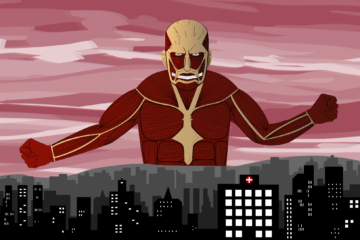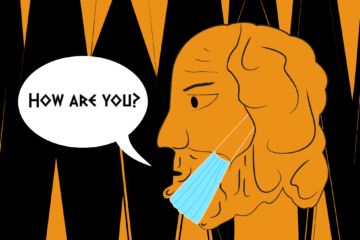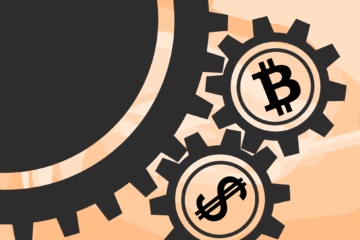In the last essay we established that in the ideology of liberal democracy resides a paradoxical kernel that struggles to compromise individual rights and collective good. The individual rights fundamental to the liberal side have to be – somewhat but necessarily – infringed upon by the democratic side embodying a General Will, or common good. But in order to conceal, or disavow, the contradiction, the state is created as a fetish to absorb the blame for such incongruities. What remains for the state to do, therefore, is to commit the necessary infringements in the unofficial and grey legal areas where the shady deeds are just obscure and ambiguous enough that the individuals can choose to ignore them in ordinary times.
This societal contradiction remains ignorable for as long as the ritualistic status quo is preserved. But upon game-changing turn of events, the needs of the collective also change and hence, so do ‘fundamental’ rights. Naturally, some of those who were benefiting, now find themselves drawing the short straw, and their position evolves into the claim that the state is taking away their rights. Yet what they do not admit is the serious moral shortcoming inherent to ‘fundamental individual rights’, which ignorance had been necessary for the maintenance of the rights they used to enjoy.
Let’s look at the recent case of sanitary restrictions imposed in most Western countries.
Of consenting guinea pigs: can the only choice be a free choice?
One of the main claims against mass-vaccination is that the vaccine is not tested enough, which should therefore mean that it cannot be mandatory. On the one hand, the argument does provide a valid critique as to how the same science and its method of rigour and repeatability suddenly changed its yardstick as to what evidence is sufficient – so it seems that science and political necessity are not inseparable.
But on the other hand, we still have to ask these vanguards of liberty, who they think actually volunteers to be test subjects in ordinary times. Is there some personality or perhaps a culture that simply enjoys being lab rats? We can confidently assume that such people do not exist in any significant manner, and that in reality, the ‘volunteers’ are bound to be the individuals who do not have many more alternatives in order to subsist. So, the irony of the pro-freedom position is that it reserves the right to be sceptical of vaccines, and demands more rigorous testing which would naturally be conducted on those who are compelled to make that choice.
The free market as morality-laundering
Let us imagine we were confronting a virus with a mortality rate higher than 50%. This would mean that the urgency of a vaccine would no longer be the question and that rejecting a vaccine would be a matter of suicide rather than statistical scepticism. Still, test subjects are necessary for vaccine trials, and a percentage of the population is necessary to conduct the tests. Who is going to volunteer? Given the prized atomisation of society in liberal logic, there can be no symbolic space for honour or heroes of the nation since these are but fantasies of collectivist societies.
The major moral question would therefore be concerned with who the guinea pig should be. This dilemma would then be presumed solved under the provision of financial remuneration: at this point, the economic fetish would be evoked once again in order to establish the criteria of free choice in a free market. But as this same theory holds, the price will go down to the lowest bidder, meaning that the rich will not volunteer themselves or their children. Through the economy fetish, the less fair reality of subjection-through-precarious-conditions is thus simply overlooked by the vanguards of freedom because they see anything happening within the free market as consensual and therefore morally neutral.
So it seems that the one benefit of the current political paranoia on the virus, is that there was an equality of guinea pig-ism, which is precisely what upset the freedom-fighters who are generally those who can speak from a position of relative privilege. The hand that systemically coerces the disenfranchised to take the risk for the sake of the collective (see the irony?) now grew large and forced the sacrifice upon the entire population.
From Night-Watchman to Night-Garbage Man
So far we have established that the individual freedoms guaranteed by the liberal dimension of our society, come at the cost of restricting the freedom of the people ignored in the shadows. This restriction is then neutralised under the guise of remuneration which allows desperate individuals to sell back those freedoms.
The next argument, therefore, is that freedoms are not fundamental, since they can be sold. The only freedom that remains universal is to engage in transactions, whereby anything has a price.
But we all believe this cannot be true; after all, aren’t there myriad prohibited goods, and forbidden transactions even in a free market? Which brings us back to the paradoxical kernel of liberalism: how is it that we restrict free human activities in order to protect the same sacred human liberty? This aporia is one that must be answered even by the most minimal of states (the Night-Watchman): since there are always some freedoms which are necessarily restricted, liberty is not in-itself inviolable. It is at best desirable.
And thus comes up the key word: Desire. Liberty is the sublime unreachable object around which our social order chains itself, but which it can never fully attain and provide to its subjects. With this, it becomes much clearer why the Night-Watchman, whom we employ in order to protect liberty from a distance, actually has a wider job description: in the cover of night, it also carries out the dirty deeds and disposes of the trash we do not see – in order to fix society’s inconsistencies and thus to protect society from itself.
The freedom to compulsion
In a liberal democratic system, individual rights are maintained by means of the ‘necessities’ of the trade fetish. And if the market needs change, then so do our rights.
If by ‘rights’ we mean the essential and unsellable entitlements, then we have already shown that no such thing has ever existed. Alternatively, if by rights we have always been referring to a set of principles to be enforced in order to maximise the function of the system, then mandatory vaccination does not take away anything that was not meant to be taken away at one point or another.
It could be argued that the current restrictive measures do not have freedom at their heart. But in that case, nor did the previous ‘normality’. Freedom was just given with an implicit demand to produce and consume, but now that the cattle is in danger, the farmer must introduce quarantine to the herd. Even if one insists on denying that there is a public-health danger, what they nonetheless fail to recognise is that we exist in a political crisis; and as with any crisis, planning is introduced to save whatever fetish is in place to animate the commonwealth.
Therefore, the sanitary regime is not antagonistic to liberalism, but is in fact its obverse, previously-hidden side; the freedom-fighters suddenly experienced first-hand the strong arm that had always been covertly present. They had not recognised it simply because they had chosen not to; that is, they could afford to let the Night Garbage Man do his dirty work while they were on the receiving end of the ideological demand.
Protesting to deny the fetish
The controversy on restrictions thus marks the conflict in liberal democracy: the official demand for upholding human rights versus the Night Garbage Man’s necessarily clipping from individual life, for the sake of the whole.
In the context of COVID, the protesting Freedom Fighters are trying to rationalize and pragmatize the fact that not many people are actually dying and that we can’t stop the state’s clockwork for every single life that may be threatened. Although not consciously, they are attempting to remind us of the state’s obscene murky responsibilities that we all consciously know but simply never acknowledge. Yet even the vanguards of liberty are limited and cannot expose everything, for that would bring about the collapse the entire commonwealth fetish to which even they are attached.
The Freedom Fighters’ strategy is therefore to reason out why the restrictions are exaggerated, without admitting that liberal ideology (as any other ideology) has always functioned by ignoring the obscure and inevitable casualties at society’s fringes.
Freedom of movement always required passports
Let’s now look at mandatory vaccination for travelling or attending public spaces, which can easily be articulated as the triumph of pragmatic measures over fundamental liberties. And this has been the main ammunition of the Freedom Fighters’ strategy.
Their argument, with some valid points, is that what we’ve witnessed so far has been a case of extreme expediency: the restriction of freedoms is meant rather as a blackmail and not because travelling is particularly a huge threat to the containment of the widely-spread virus. In other words, in many jurisdictions, it seems to be okay for one to move around their place of residence and hop onto crowded busses, but not to cross a border.
Furthermore, evidence that vaccination stops the spread is far from clear cut and to make things worse, it seems to change week by week. Perhaps it will be proven that vaccines do stop the spread, but that would still have come long after the vaccine-passports were first proposed and implemented by governments.
For the pragmatic individual, the solution is simple, just get vaccinated and you can also travel, double win. But the paradox is encountered by the individual who believes in both the benefits of vaccination and the fundamentality of rights. One wishes to take the vaccine, but doing so would also be a subjection to the diminishment of rights on which their commonwealth is supposedly established. Taking a vaccine without protest would in this case set a precedent that laws and rights can be, not simply broken, but rather conveniently forgotten once a highly-politicised event occurs. The symbolic space currently occupied by the virus can be occupied by any signifier; terrorism, climate change, peaceful demonstrations disrupting the economy…
The main argument of the Freedom Fighters therefore rests on the acknowledgment of the power of fetishes; the latter are first animated and then given primacy as the central node around which the General Will should become identified. In recognizing this, their argument can apply the logic of liberation in that it warns against any object that can be used to restrict individuality and bring us further towards a collectivity which, at worst becomes a totalitarian regime.
However, the limitation of the Freedom Fighters is, of course, that they do not admit that their ‘normality’ was also established on an ‘original’ fetish – the economy. Furthermore, they do not acknowledge that whatever restrictions are being imposed on the individual today, are borne of the same concern for the economy. By imposing the romantic ideal of individual freedom on what is in fact a commonwealth, they contribute to hiding a reality in which workers and traders are the equivalent of livestock in a massive farm, rather than individuals trading freely in a game of a ‘global market’.
The extent to which the virus is lethal is beside the point. Why? Because if the economy can revolve around the fetish of a ‘money’ whose value is entirely imaginary, why should it not also be restructured around a virus that is believed to pose an inherent threat to humanity. The Freedom Fighters here emerge, not as the vanguards of reason and rationality (as they purport), but merely as the acolytes of a money fetish which they are not prepared to redefine.
The perpetual state of exception
What the freedom protestors in fact represent is the disavowal of the inherently coercive kernel of ideology – in this case the liberal democratic one – which is a result of its inevitable inner contradictions. For example, in the realm of ideas, they argue against big pharma’s marriage with state enforcement; yet they do not acknowledge that this potential Leviathan is a fetish resulting from an underlying structure of free enterprise and private property, whose rights are in turn protected by the power of the state. Uncritical of the potential power of free enterprise, they (rather ironically) turn their dissatisfaction towards the fetishised state, in order to deny the symptom and keep the liberal fantasy alive.
The fundamental mechanism of fetishism is precisely that of not recognising the fetish around which the symbolic order is fettered and to take it as an obvious and natural thing-in-itself. As fetishists par excellence, the freedom fighters identify with current animations such as money and state, through which identification they then qualify their ‘natural’ freedoms. Thereafter, they see a novelty like the COVID virus as a false signifier around which tyranny can be established to replace our society of ‘liberties in a vacuum’. What they do not realise, therefore, is that even before the pandemic, society had organised itself around the unending emergencies and insecurities of the market.
It is indeed ironic how in this contemporary political phenomenon, the act of protesting has an inherently conservative kernel, the desire for the old fetish and its fantasies. If you think that the current COVID restrictions are taking away your liberties, then you have been asleep since the French revolution.



0 Comments